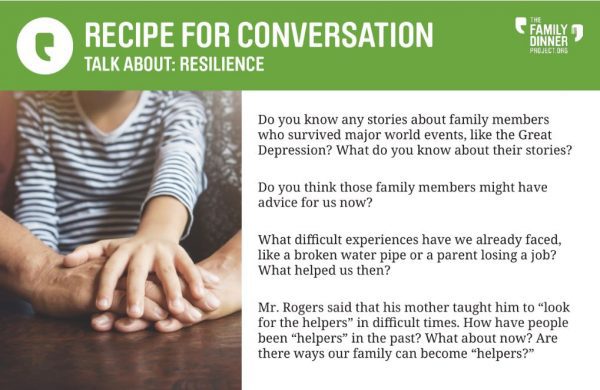Newsletter: May 2020
Getting Along and Taming Tension During Quarantine

An exasperated grandfather we know recently sat down at the table, glared at his grandsons, and asked, “What is it about dinner that makes you guys decide it’s time to start fighting?”
His bickering grandsons are no different from most other kids. They’ve been used to having school, friends and extracurricular activities to give them a break from each other. Now they spend all day negotiating shared spaces to complete their schoolwork, music practice and other needs. By the time they sit down to dinner, their coping skills are spent. And the adults around them aren’t doing much better. Even families who have resolved to handle the shutdown with an upbeat attitude are starting to find their patience wearing thin. After more than a month of strict social distancing, everyone is feeling the strain of forced togetherness.
Unfortunately, we’re not likely to get back to normal routines anytime soon. It’s essential that we figure out how to help everyone get along during this uniquely stressful time, so here are some tips from Dr. Anne Fishel:
- Sibling squabbles: “Why does my brother always get to choose what’s for dinner? It’s not fair!” If you’re hearing more of this kind of complaint lately than usual, you’re not alone. Dr. Fishel stresses that it’s important to show that you understand what might be causing the uptick in behaviors right now. You might try saying something like “I know I go looking for a fight sometimes when I’m really feeling upset, worried or scared. How about the two of you? Anything else on your minds besides both screaming about who gets the last cookie?”
Under these current circumstances, you might also find that there are times when they just need a break. If dinnertime behavior escalates, don’t let the table (or wherever you eat) become a battleground. Dr. Fishel suggests a mutual time-out for everyone: “How about if we hit the pause button. Take a deep breath and step away from the table for a minute.”
You can find more ideas for dealing with mealtime behavior and defusing tension here: How to Beat Tension and Conflict from the Table - Parent-Child Conflict: Dr. Fishel recommends looking at our own feelings as parents when the tension starts to rise. “Own up to your own short fuse and reflect on why you’re feeling cranky. This is great modeling for your children to see how you handle not being your best self, and how crankiness can hide other feelings that your kids may be experiencing as well.”
She also cautions that parents need to pick their battles wisely, especially right now. Don’t spend time and energy focusing on things like table manners when emotions are running high; stick to the bigger stuff, like respectful communication. And speaking of respectful communication: “Try to keep dicey topics off the table, like missed homework assignments, or spending all day playing video games.” Try some table games instead, or playing music that can redirect everyone towards a better mood.
Learn more about supporting kids and teens during the current crisis: 7 Ways to Support Kids and Teens Through the Coronavirus Pandemic - Couples Conflict: Yes, parents are bickering right now, too. Dr. Fishel points out that picking fights with the people we love is a common way to avoid feelings of sadness or worry. For example, most of us have had at least a few “Can’t you remember to close your door so I don’t hear you say 20 times, ‘At the end of the day, blah, blah, blah?’” moments as we’re navigating work-from-home arrangements with our partners. Or we might be sparring over handwashing, safe grocery shopping or household chores.
It’s important to recognize that this is normal. “Marriages and long-term relationships weren’t built to withstand this much contact,” Dr. Fishel reasons. “Even couples who are retired and spend more than 50% of their time together, have hobbies and do volunteer work that engage them with others outside the home.”
She recommends that couples who are experiencing more daily conflict than usual “channel a sense of boredom.” In other words, rather than having the same kind of fight over and over again — Why are the dishes in the sink again? Why must you always remind me to wear a mask to the store, as if I’m a child? — allow yourselves to get bored with the argument. Stop and say, “We know where this is going. Why don’t we talk about something more interesting?” And if you do argue, try to follow the “magic ratio” of offering five positive comments or non-verbal gestures of support for every snide comment you make. Kindness is key, even when patience is in short supply.
Get more insights into how couples can get along while stuck at home: Stuck at Home With Your Partner? Look to Retirees to Make it Work
The current situation almost guarantees that families will experience tension or conflict of some kind. The best way to get through it is to remember that we’re all doing the best we can under very unusual circumstances, and to try to give our families — and ourselves — a little bit of grace and understanding. Hang in there!
Family of the Month
Families across the country are getting creative in their quest to connect and share meals during quarantine. We talked to two different families who have found a way to make family dinner work despite being separated.
Real Family Dinner Projects: Families in Quarantine
Food

If cooking and dishwashing are a bit overwhelming by now, these savory “mug cakes” are the perfect solution. Each family member can make (and clean up) an individual serving using whatever ingredients you’ve got on hand!
Fun

A photo caption contest is a fun and creative family activity, either in person or online — and it can provide a way for grumpy family members to use technology at the table in a positive way.
Conversation

Research shows that kids who know their family stories are more resilient in the face of challenges than their peers. These conversation starters can help everyone in the family remember that others have overcome difficult times, too.
Recent Newsletters
- Family Dinner Has Gotten Expensive - April 2024
- Is it the Family, Or the Dinner? - March 2024
- Black History Month at Family Dinner - February 2024
- New Year, Same You - January 2024
- Sharing the Holiday Load - December 2023
- What’s Your Thanksgiving Story? - November 2023
- Family Dinner: Stressful, or Stress-Busting? - October 2023
- New Ways to Ask “How Was Your Day?” - September 2023
- Low Stress, Low Cost, Low Waste Dinner Hacks - August 2023
- Family Dinner After Divorce - July 2023
- Preparing Teens for Dinner Independence - June 2023
- Talking to Kids About Technology - May 2023
